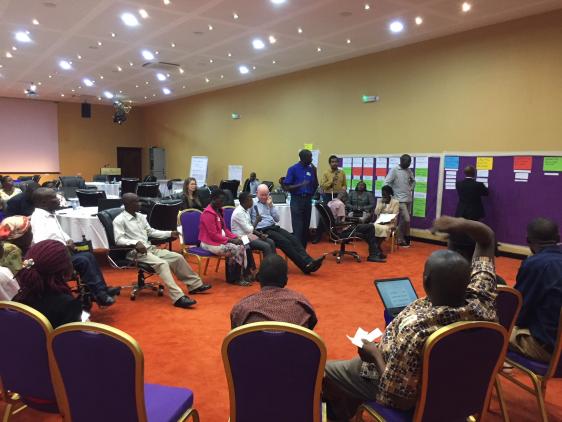View this email in your browser

Monthly Newsletter | Issue 15 - November 2021

Reference Group on Inclusion of Persons with Disabilities in Humanitarian Action
Welcome to the 15th edition of the DRG Newsletter!
November started with the powerful call from persons with disabilities, their organizations and allies for being included in climate action from Glasgow to all over the world. For the first time in the history of Parties to UN convention on climate change conference, COP26 witnessed participation of delegations from organizations of persons with disabilities accredited as observants. Check this blog to learn more about COP26 for persons with disabilities including links to watch side-events specifically dedicated to disability inclusion.
Climate change is the urgent issue for every individual, every group and every network. Therefore, the reference Group on Inclusion of Persons with Disabilities in Humanitarian Action is committed to join the global movement to combat climate crisis within the limits of its mandate and capacity. We are in particular concerned with impact of climate change on persons with disabilities living in humanitarian contexts, and need to utilize the potential of the DRG to ensure that the climate adaptation and plans by humanitarian actors is inclusive of rights and perspectives of persons with disabilities. We invite all members acting in the area of climate action in emergency situations to reach out to co-chairs to discuss DRG engagement.
As always, we hope you find this useful, and encourage you to share with us any updates you would like to see included in our next newsletter!
Elham Youssefian (International Disability Alliance), Christian Modino Hok (CBM Global) and Kirstin Lange (UNICEF)
© International Disability Alliance
Disability Inclusion in COP26: a Firm Step on a Long Road
-->
Disability Inclusion in Climate Action: New Guide Published - CBM UK
>> Link to the Full Blog
-->
Disability Inclusive Climate Action COP26 Advocacy Paper
>> Link to the Full Blog
-->
Suggested commitments to be made by states, multilateral agencies and civil society at the upcoming Global Disability Summit (GDS) have been released. The suggested commitments were developed in consultation with the Global Action on Disability network, the Disability Reference Group and disability experts including Organisations of Persons with Disabilities, and are meant to inform, inspire and incentivize ambitious commitments contributing to a successful GDS.
Stakeholders are invited to register commitments by selecting from the menu. If what you wish to commit to is not adequately reflected in the menu, you may register your own commitment(s) by choosing “other” and filling in the form. It is also possible to update commitments made in the 2018 GDS by selecting “Update Existing Commitment”.
>> Link to the Menu of Commitments
-->
The International Review of the Red Cross has finalised the call for papers for an upcoming edition focused on International Humanitarian Law (IHL) in the context of disability.. They are pleased to release this call for papers with a view to having the edition scheduled to launch on International Day of Persons with Disabilities, on 3rd December 2022. Deadline by January 15th, 2022
-->
Accessible Construction and Universal Design in Humanitarian Settings - MSF
>> Link to the Recording of the Webinar
>> Link to Accessibility Guidelines "Accessible and Inclusive Design Handbook"
>> Link to the Accessibility Checklist "Physical Accessibility Assessment Form"
>> Link to E-Learning "Inclusion of Persons with Disabilities Overview"
>> Link to Toolbox "Inclusion of Persons with Disabilities"
-->
New Video on How to Include Organisations of Persons with Disabilities (OPDs) in Humanitarian Action
It has been developed to serve as a tool to support organisations raise awareness on the importance of involving persons with disabilities and their representative organisations in humanitarian action.
>> Link to the Video
For more information, contact Marion Steff, International Cooperation Manager at the European Disability Forum: marion.steff [at] edf-feph.org ()
-->
Deadline - January 17, 2022. However, this date is more flexible for individual submissions.
>> Link for Individual Submissions
-->
Intentional Inclusion - Persons with Disabilities and Food Security Programming - December 2nd at 10 AM CET
This event is organized by World Food Programme's (WFP) partners Trinity College Dublin and builds on over a year of experience partnering with WFP on building an evidence base for the inclusion of persons with disabilities in food security programming.
This event will also include a Welcome from Tom Shakespeare, Professor of Disability Research, London School of Hygiene and Tropical Medicine; Opening Remarks from Amir Abdulla, WFP Deputy Executive Director and an Overview from Gerard Quinn, the UN Special Rapporteur on the rights of persons with disabilities. This will be followed by a panel discussion.
>> Link to Register to the Webinar
>> Link to the Invitation
-->
